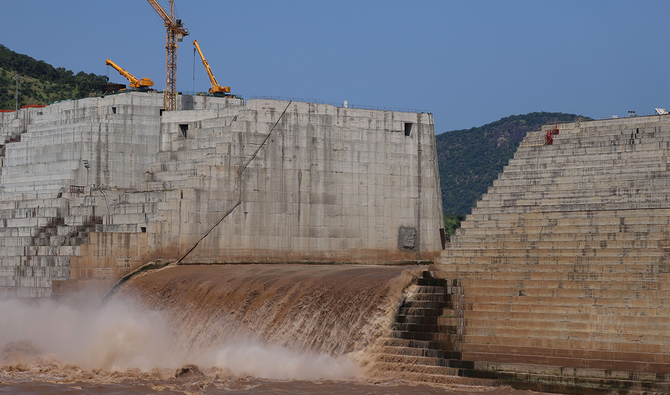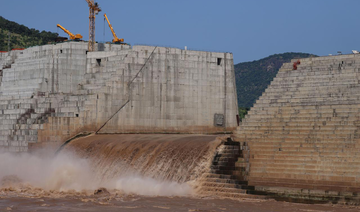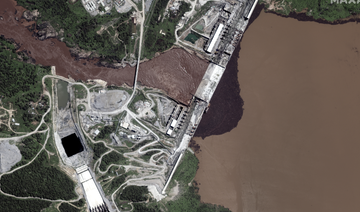CAIRO: The Egyptian Ministry of Irrigation has announced the failure to reach a unified draft on the Renaissance dam negotiations.
This came after the end of the current round of negotiations between Ethiopia and the downstream countries of Egypt and Sudan, during which they discussed a consensual preliminary formula for an agreement that regulates the rules for filling and operating the dam.
The Egyptian Ministry of Water Resources said in a statement that a meeting was held on Saturday, based on the outcomes of the African mini-summit, headed by the water ministers from the three countries under the auspices of the African Union (AU) and in the presence of observers from the member states of the AU Union Office, the US and the EU, and experts of the AU Commission, to discuss reaching an agreement.
The ministry stated that the incompatibility between the three countries continued on many legal and technical points regarding the initial compiled version of the draft prepared, as it had not yet lived up to its presentation to the AU office body headed by South Africa.
The ministry revealed that after a lengthy discussion, the water ministers agreed that each individual country would send a letter to the South African president that included its vision for the next stage of the negotiations.
The Sudanese Ministry of Irrigation stated that the current negotiating round ended without setting a new date for its resumption.
The ministry said: “There is a need for political will to reach an agreement. The continuation of the negotiations in their current form will not lead to achieving practical results.”
Sudanese Minister of Irrigation Yasser Abbas announced that the merger of the proposals of Sudan, Egypt and Ethiopia in one draft on the Renaissance Dam had stalled.
He added: “During the session, the experts of the three countries presented a report on the work of the committees in an attempt to come up with a unified draft agreement from the combined draft of the proposals submitted by the three countries.”
“After a careful evaluation of the development of the negotiations and a review of the work of the expert teams over the past days, it became clear that the process of merging the three drafts had stalled,” he said.
Former Minister of Irrigation Dr. Muhammad Nasruddin Allam said on Friday that the main differences between the three countries were about filling and operating the Renaissance Dam in periods of drought, the extent of the legal obligation of the agreement, the clause of dispute settlement, future Ethiopian projects and the rights of Addis Ababa in a water share from the Blue Nile.
He said: “It is clear that the technical disputes are limited compared to the legal and political disputes, and that the upcoming negotiations, if there is any intention to continue them, must be political with technical support, led by, for example, the minister of foreign affairs.”
A member of the former Sudanese delegation to the negotiations, Dr. Ahmed Al-Mufti, said that his country should consider the Ethiopian intransigence and the storage of water without agreement, a violation of international law and the directives of the UN Security Council and the AU, and a threat to international peace and security, which gives Sudan the right to self-defense under Article 51 of the UN Charter.
He also called on Khartoum to demand that Ethiopia stop any activities related to the dam until an agreement was reached that satisfied the three parties, with the Grand Ethiopian Renaissance Dam being emptied of the water of the first, illegal filling, during the coming drought season.
Al-Mufti also requested that the UN Security Council nominate a UN delegate to oversee the negotiations, on the condition that Ethiopia did not return to any activity related to the Renaissance Dam until after the conclusion of a binding agreement that serves the interest of the three parties.
A US State Department official said on Friday, that “the work done by Egypt, Ethiopia and Sudan during the past months shows the possibility of reaching a balanced and fair agreement regarding the Renaissance Dam, which takes the interests of the three countries into consideration.”
The official, who asked not to be named, said in statements carried by Sky News Arabia that “Washington is convinced that a solution can be reached through constructive dialogue and cooperation between the parties. The United States is committed to staying in contact with the three countries until an agreement is reached.”
A Pentagon official had previously refused to confirm the accuracy of the Foreign Policy magazine’s report that Washington had frozen aid to Addis Ababa worth $130 million due to the Renaissance Dam crisis.
























